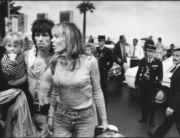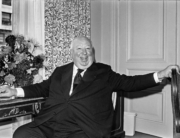It’s 2016. Does anyone still believe that fashion isn’t art? Try asking at the Metropolitan Museum of Art’s Costume Institute, where the staff fights for fashion’s artistic worth like it’s 1899, battling an army of invisible fuddy-duddies. The First Monday in May depicts the Costume Institute striking a decisive blow against the bluenoses, rubbing out the line between fashion and art once and for all in a blaze of celebrity, hype, and money. If only the moment felt more triumphant.
The film opens in 2014 as curator Andrew Bolton joins Vogue editor and Costume Institute trustee Anna Wintour in planning the organization’s biggest and most ambitious show yet, China: Through the Looking Glass. Their unstated goal is to surpass 2009’s controversial Alexander McQueen exhibition, which broke attendance records and set a high aesthetic bar. What follows is footage of Wintour as she prepares for the Met’s insanely lavish, A-list gala, where she is charged with raising $125 million, and Bolton as he checks out designer collections and goes to China for inspiration.
The institute’s staff take Wintour’s side against “old-fashioned traditionalists,” in Wintour’s words, as well as the Puritanism that supposedly makes Americans wary of fashion and hype. “Some people have very 19th-century ideas of art,” sniffs Bolton. In the words of head curator Harold Koda, Wintour represents the ideal antidote to the old guard, thanks to her understanding that fashion, when paired with celebrity, leads to something bigger than both. “When you see Rihanna in a couture gown, it’s transcendent,” he declares.
Wintour and crew bring that desire to push envelopes to the China show, which is meant to be—what? A dialogue between cultures? A fashion extravaganza? A tantalizing provocation mocking political correctness? Evolving conversations move the goalposts from artistry to glitz. Chinese film director and exhibit adviser Wong Kar-wai and the curator of the museum’s Asian art collection find their influence over the show diminished, while socialite Wendi Deng Murdoch and The Great Gatsby director Baz Luhrmann take the reins. It turns out the battle between glitz and artistry is bogus, and anything but glitz never has a chance. (On a personal note, I remember going to the show and being overwhelmed by its brash mix of opulence and kitsch. Fashion may be art, but not all art can rise to the level of Alexander McQueen’s vision.)
“As an icon, Anna’s unique,” someone intones, and indeed, Wintour-burnishing ranks high on First Monday’s agenda. The film reinforces Wintour’s legendary status with multiple shots of her clutching her trusty Starbucks cup as she stalks the halls of the Met in her signature bob. She tries to shrug off her dragon lady reputation, and showbiz pals come to her defense for being an unfairly maligned, outspoken woman. However, footage of staff meetings—where she talks to her staff as though they are all dim bulbs and cowed employees never dare to contradict or question her pronouncements—make a strong counterargument. We also catch a fleeting sight of septuagenarian Vogue editor Grace Coddington, seemingly relegated to picking clothes up off the floor after one of Wintour’s imperious decree-fests.
Everyone toiling on the show—mostly young women—takes their responsibilities terribly seriously, and their glamorous industry does not come across as much fun. But the opening night looks truly amazing, and the Met Ball racks up an enviable array of celebrities, all chortling with delight and entranced by the spectacle. The museum racks up 800,000 visitors, putting the ghost of McQueen to rest.
Awaiting Miley Cyrus, Beyoncé, and Justin Bieber before the big shindig, Wintour is shown suspiciously fingering some curtain fabric. “What is this?” she asks. “Nylon? Rayon?” Then she answers, “Made in China!” She giggles, and her staff does, too, because they have to, and finally so do we, because humor in this movie is in short supply. But the dismissive laugh may reveal more than she thinks.







Leave A Comment